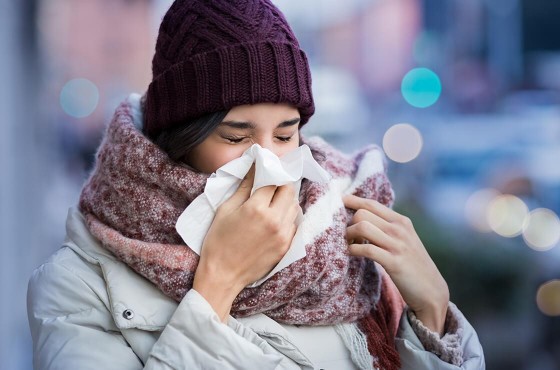Strengthen your immune system to better resist microbial attacks
Written by Paul Musset, Doctor in Pharmacy | published on | updated on 15/04/2024

Our immune defences are a complex system that protects us from a multitude of external aggressions all year round. It is when it starts failing that we become aware of its importance. Here’s how to help it remain effective.
How does the immune system work?
The immune system is a very complex set of organs (lymphoid organs: thymus, bone marrow, spleen, tonsils, lymph nodes, as well as the digestive system), cells and proteins whose role is to differentiate what belongs to the body from intruders and to neutralise the latter: viruses, bacteria, fungi, parasites, etc.
How do our immune defences act in the event of aggression by a pathogen? There are two kinds of reactions.
Nonspecific response: The organism does not need to “recognise” the intruder to start protecting us. The skin is our first line of defence against enemies. Its beneficial microbial flora, relative dryness and acidity normally prevent many intruders from entering the body. There is also sneezing, coughing, nasal and bronchial secretions, tears, etc., all of which are used to evacuate germs. Finally, local inflammation is also a defensive reaction: In case of injury, the skin reddens because the blood flow increases to bring white blood cells (phagocytes) that “eat” the microbes, while proteins called interferons prevent viruses from multiplying and fever accelerates cellular reactions.
Specific or acquired response: This response involves learning to recognise the various “enemies” and fighting each of them according to their specific characteristics. B lymphocytes, other types of white blood cells, produce different antibodies for each pathogen, or even for tumour cells. Antibodies adhere to them and bring them to the so-called cytotoxic T lymphocytes, which destroy them. The second confrontation with a microbe is much more effective than the first, since the organism immediately recognises it. That is why some diseases can only be caught once.
The skin, a defence that should be cared for
Our skin is the first barrier against microscopic aggressors. While it is essential that it be kept clean, it is also important not to overdo it and sterilise your environment. Similarly, care must be taken not to attack the skin with excessive scrubbing or abrasive products, which would destroy the hydrolipidic film protecting its integrity and eliminate its beneficial microbial flora.
The enemies of our immune defences
This defence system may be extremely sophisticated, but it is based on a fragile balance that can be disrupted by certain factors:
- Fatigue, lack of sleep
- The cold
- Lack of regular physical activity
- Alcohol and tobacco
- Excess bodyweight
- Lack of ventilation and exposure to light
- Chronic stress (recent research shows that prolonged stress alters the expression of white blood cell genes, making them hyperactive: they create permanent inflammation and even attack healthy cells)
- Some medication, such as chemotherapy
- A deficiency in certain nutrients (see below)
Which nutrients support the immune system?
- Iron: An iron deficiency reduces the effectiveness of phagocytes and lymphocytes. Where it can be found: tofu, meat, offal, fish, mussels, lentils, etc.
- Selenium: It has an antioxidant effect that protects white blood cells. Where it can be found: seafood, Brazil nuts, fish, etc.
- Copper promotes the reaction of antibodies against antigens. Where it can be found: offal, nuts, seafood, pulses, etc.
- Zinc contributes to the proper functioning of the thymus, an important lymphoid organ. Where it can be found: meat, seafood, fish, eggs, etc.
- Magnesium stimulates the production of white blood cells. Where it can be found: whole grains, seeds, dried fruits, cocoa, etc.
- Vitamin A is necessary for the functioning of special stem cells that only activate in emergencies, such as microbial infection. Where it can be found: liver, offal, carrot juice, sweet potato, pumpkin, etc.
- Vitamin E strengthens the nonspecific immune response, particularly in the elderly. Where it can be found: walnut and hazelnut oils, wheat germ oil, sunflower oil, cod liver oil, etc.
- Vitamin C is an antioxidant and promotes the production and action of phagocytes. Where it can be found: fresh fruits and vegetables (blackcurrant, kiwi, orange, lemon, bell pepper, etc.)
- Prebiotics are plant fibres that promote the proper development of the intestinal flora. Where they can be found: fruits, vegetables
How can a healthy lifestyle strengthen the immune system?
In the case of repeated microbial infections, it can be assumed that the immune system is weak and that it must be taken care of urgently. Good lifestyle habits are an initial essential foundation: exercise equivalent to at least 30 minutes a day of walking, not smoking, avoiding alcohol, getting enough exposure to outside light in both summer and winter, properly hydrating, sleeping at least eight hours a night, and eating at regular intervals is a good place to start.
On the dietary side of things, you can increase your consumption of foods rich in nutrients that promote an immune response, as well as fermented foods (sauerkraut, kefir, yoghurt, etc.), which are appreciated by the intestinal flora, or rich in omega 3, not to mention garlic, onion and good herbs like thyme.
Finally, anything that helps to prevent stress from becoming chronic can be useful. Many studies show that regular meditation or other disciplines such as Qi Gong improve the immune response.
Food supplements with recognised properties
Sometimes it is difficult to have a perfectly healthy diet that supports our immune defences. To compensate, food supplements are incredibly helpful, practical and well balanced to suit the body’s needs. Cocooncenter offers a wide range of high-quality food supplements and natural products known to boost the immune system, such as echinacea, essential oils, royal jelly, vitamins and trace elements, etc. Not to mention preparations based on microbiotic strains that can be useful when an infection or treatment damages our precious intestinal microbiota.
Our immune defences work tirelessly. Without them, the billions of viruses and bacteria with which we are in contact would never let us rest. It is a well-organised army, but it needs support. It is up to us to provide it with ideal working conditions!
What you should remember about strengthening your immune system:
- Immune effectiveness has little to do with genetics. On the contrary, it has a lot more to do with lifestyle and individual history of exposure to pathogens.
- So children’s environments must be clean, of course, but not so clean as to sterilise everything around them! Their immune systems must learn to recognise enemies.
- Targeted dietary supplements can help in a natural way.



















